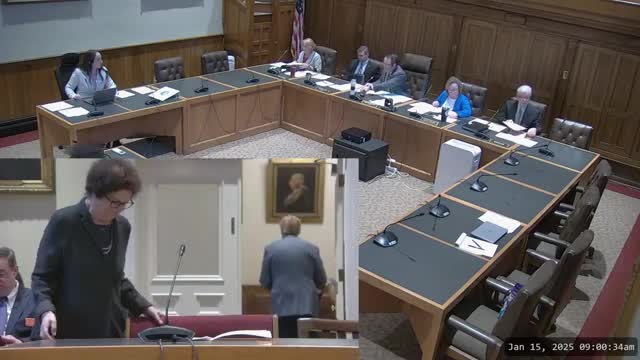Senate committee advances bill letting DHHS assess need for extra pediatric beds at Cedar Crest
Get AI-powered insights, summaries, and transcripts
Subscribe
Summary
The Senate Health and Human Services Committee voted by consent to advance Senate Bill 18, which would allow the Department of Health and Human Services commissioner to evaluate and request additional pediatric intermediate care beds at Cedar Crest without lifting the long‑term care bed moratorium.
Senate Health and Human Services members voted by consent to advance Senate Bill 18, a measure that would let the Department of Health and Human Services (DHHS) commissioner evaluate whether New Hampshire’s only pediatric intermediate care facility needs more beds and, if so, seek fiscal‑committee approval to add them.
The bill’s prime sponsor, Sen. Cindy Rosenwald, told the committee the proposal creates a process for the commissioner to "assess the need for serving New Hampshire's children with complex developmental and medical needs" without dismantling the long‑term care bed moratorium that has been in place since 1995. Rosenwald said the fiscal committee would vet any recommendation because expansions could raise Medicaid costs.
Supporters described Cedar Crest Center for Children with Disabilities in Keene as unique in the state’s care continuum for medically complex children. Dr. Jay Hasten, president and CEO of Cedar Crest, told the committee that the facility provides post‑acute care, special education and respite services and serves infants through age 22. He said the center currently had 25 occupied beds and had been temporarily authorized for 28 beds last year. Hasten provided clinical detail on the population the facility serves, saying, "40% of the children that we serve are on ventilators, for all or part of the day," and that many rely on feeding tubes.
Hasten said Cedar Crest handles both long‑term placements and a high volume of respite stays — 62 respite stays last year and roughly 100 inquiries, about 60 of which he said may be appropriate for one or more of the center’s services. He and Rosenwald emphasized the bill’s intent to allow the commissioner to examine census data and other factors and to avoid repeated legislative fixes for temporary expansions.
During questioning, senators pressed on decision criteria and workforce issues for community‑based alternatives. Rosenwald and speakers said the commissioner would consider how many eligible New Hampshire children exist, bed occupancy and whether community services are available; any recommendation would also require fiscal‑committee approval because of Medicaid cost implications.
In executive session the committee received a motion to "ought to pass" from Sen. Abarth, seconded by Sen. Prentiss. The voice vote was taken by consent and the motion advanced out of committee.
The bill does not itself add beds; it creates an administrative pathway for the DHHS commissioner to evaluate and, with fiscal‑committee approval, authorize additional pediatric intermediate care beds at Cedar Crest under specified circumstances. Further details about any recommended expansion — including exact bed counts, cost estimates and the fiscal committee’s subsequent action — were not specified during the hearing.
